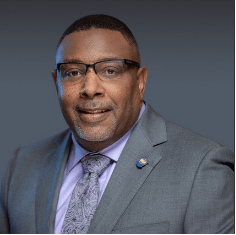NBA All-Star Alonzo Mourning Urging Congress to Support Health Care Reform that Improves Choice
MIAMI – Seven-time NBA All-Star and kidney transplant recipient Alonzo Mourning visited Washington, D.C. this week to meet with federal lawmakers – including House Speaker Nancy Pelosi (D-CA), the Congressional Black Caucus (CBC) and other House and Senate leaders – to educate them about the impact of kidney disease and ask for their commitment to advance health care reform that will improve patients’ access and choice in receiving quality kidney care.
Mr. Mourning was accompanied by leadership from Kidney Care Partners, a broad-based alliance of patient advocates, dialysis professionals, care providers, nurses and physicians groups, researchers and manufacturers working together to improve access, choice and quality of care for individuals with kidney disease and kidney failure.
While on Capitol Hill, Mourning asked lawmakers to specifically support extending the Medicare Secondary Payer (MSP) provision, which currently forces end stage renal disease (ESRD) patients off of their private insurance and onto Medicare after 30 months of dialysis. Following his meeting with CBC members, the CBC delivered a letter to Speaker Pelosi naming access to kidney care for Americans suffering from ESRD, also known as kidney failure, as a top priority in health care reform. In its letter, the CBC expressed strong opposition to any type of reform efforts that would “compromise the access and quality of care provided to millions of Americans suffering from end stage renal disease (ESRD) by omitting provisions that will expand the Medicare Secondary Payer (MSP) provision for ESRD.”
Extending MSP from 30 to 42 months, as Mourning and the kidney community support, will provide greater choice in care for patients and is estimated to generate $1.2 billion in savings to the Medicare program. These savings could then be used toward additional needed reforms, such as extending the length of time that Medicare will pay for kidney transplant patients’ immunosuppressant drugs. These medications must be taken for the life of the kidney transplant to help avoid organ rejection; however, currently Medicare will only cover these medications for 36 months.
“By allowing ESRD patients to stay on their preferred private insurance coverage for longer, they will be able to take advantage of helpful preventive care and health management services not offered by Medicare that can help them better manage their kidney disease and their overall health,” said Mourning. “Extending this access to employer-based insurance will also create the savings to Medicare that are needed to help patients keep their transplanted kidney and avoid a return to dialysis. So for patients and for the government, this policy just makes sense.”
Mourning’s advocacy efforts in Washington come on the heels of the successful passage of the “Alonzo Mourning Access to Care Act,” which went into effect in Florida on October 1. The legislation, which was passed with overwhelming support in the Florida state legislature, created the opportunity for Florida’s Medicare beneficiaries, including ESRD patients, under the age of 65 to purchase Medigap coverage for their medical needs. Under federal law, all Medicare beneficiaries over age 65 are able to buy this insurance as secondary coverage, providing them with the ability to access needed medical treatments, including kidney transplant, without cost being a barrier. The “Alonzo Mourning Access to Care Act” is expected to make 11,050 ESRD patients and 200,000 patients with other disabilities eligible for this same Medigap coverage.
Mourning, a member of the 2006 NBA Championship-winning Miami Heat, received a kidney transplant in 2003 after being diagnosed with Focal Glomerulosclerosis, a degenerative kidney disease, in 2000. He returned to the NBA following his transplant for five more seasons, retiring in 2008. Through his foundation, Zo’s Fund for Life, Mourning has partnered with the kidney community as an advocate to help individuals and families effected by kidney disease, promote kidney care education and create awareness about disease prevention. Since the creation of the foundation in 2001, Zo’s Fund for Life has raised close to $2 million for research for a cure, education for doctors and the general public, testing for early detection and creating a fund for those not able to afford the expensive medication used to treat Focal Glomerulosclerosis.
Each year, more than 100,000 Americans are diagnosed with ESRD and require dialysis or a kidney transplant in order to survive. Today, approximately 527,000 patients in the United States are living with kidney failure, and a disproportionate number of these patients are minorities. African American, Hispanic and Asian patients make up more than half the ESRD patient population.

